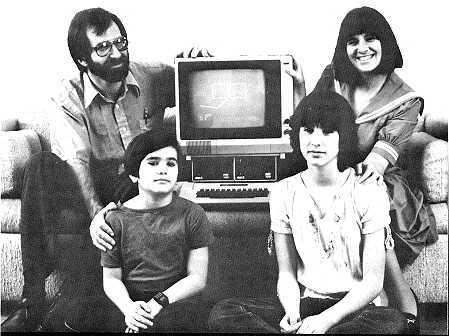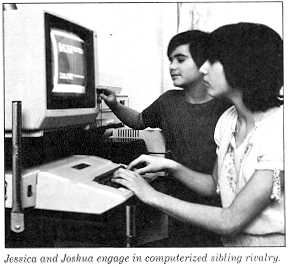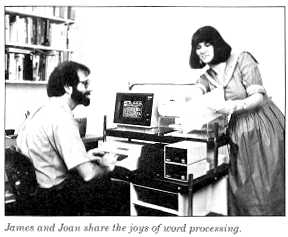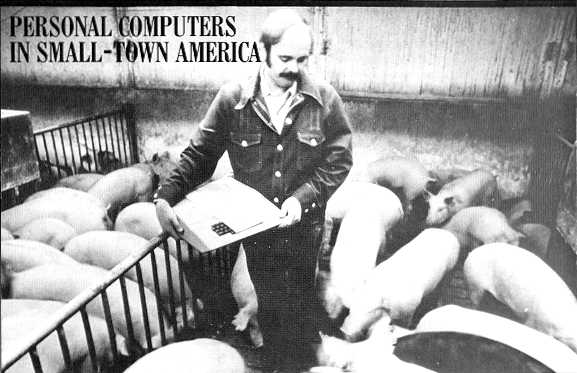
A FAMILY
COMPUTER DIARY
by James A., Joan, Jessica
and Joshua Levine
James A. Levine is director of the
Fatherhood Project at the Bank Street College of Education in New York
City. Joan Levine is a doctoral student in clinical psychology at City
University of New York. At the time of this diary, Jessica and Joshua
attended the Bank Street School for Children.
The Levines were
among the first on their block to have a home computer. Herewith a
slice of the computerized life from their family diary.
11/15/81: Arrival
JAMES: Like a kid at camp
waiting for a package full of candy, I've been checking the mail every
day since Apple agreed to lend me a computer so I could keep a yearlong
record of our family's entry into the electronic age. Today was the
day-finally! But not everybody was thrilled when I unpacked the Apple
II Plus in the living room. Seven-year-old Joshua literally danced
around it, unable to believe his good fortune. Eleven-year-old Jessica
greeted the newcomer with a combination of smug indifference and
outright defiance. My wife Joan, a self-confessed computer-phobe, rose
to a level of bemused tolerance.
JOAN: In our family, Jim always
has to buy the latest gadget. He was the first person to have an
electronic calculator, and we had Mr. Coffee before anyone else. So
when the computer came, and Jim started right in talking double disk
drive and printer and then fancy printer and color monitor, I thought:
Oh God, this is going to be a very expensive gizmo!
JOSHUA: I got really upset when
I found out that setting it up took more than five minutes.
JESSICA: I thought it was dumb
to make such a big deal over a machine.
1/27/82: Snoggle
Addiction
JAMES: Because I haven't had
time to learn how to use this machine, and because using it takes
longer than I thought, I gave in and bought a packaged game. The
salesman was a stringbean of a kid with pale skin and black pants two
inches too high above his shoe tops, one of the whiz kid types I'd
always expected to find in those stores. He sold me a version of
Pac-Man called Snoggle-a pie with one piece missing that scurries over
our screen, swallowing little dots while escaping being swallowed by
round white "ghosts."
At first Jessica largely avoided the game, making it
clear she had the same disdain for the home computer that she shows for
the new computer in her classroom. Joshua, always ready to try
something new, took to it eagerly but is often frustrated. He can't
coordinate his small seven-year-old fingers quickly enough to keep from
having his character eaten.
Still, Josh is hanging in there. And Jessica has
been sneaking in to play when no one is looking. They're getting more
and more hooked. In certain ways it's my greatest computer fear come
true: just another version of the idiot box, keeping the kids from
reading, exploring, dreaming.
And yet I'm fascinated by their determination and
dexterity. They move the Snoggle character confidently around the
screen, acting very blasé about it while I stand there using
body
English to show that I want them to move in a different direction. They
have, in effect, learned some sort of strategy, figured out the
internal logic of the game. Is it any better, or worse, than the other
games they play? My concern is that it doesn't seem to involve any
deductive reasoning, any analysis. It's sort of like riding a bicycle,
but without the virtue of fresh air, companionship or rigorous
exercise. Anyway, they love it. They come running downstairs to report
their scores or to tell us they've advanced to cherries or oranges, as
if we knew what that meant. And once in the middle of a game they stick
to the machine as if they were baby octopi with suction cups. I've had
to turn the power off to get them to come to dinner or to the phone,
even to talk to their friends. What's going on here?
JOAN: I feel the same way I
felt about Sesame Street when the kids were little: something to do
when "there's nothing to do." I wonder if the games aren't a way of
making the computer less formidable, more familiar.

3/8/82:
Educational Games?
JAMES: Tonight Joshua was
playing the hangman game, where the computer offers up a list of
categories-household pets, presidents, colors, spelling-and then gives
you blank spaces to guess letters for the word in your category. You
can pick to play at the easy, hard or expert levels. It seemed like
simplistic nonsense, but then I started playing with the presidents
quiz and found it somewhat intriguing. It forced me to remember names
of presidents I had long forgot. Tyler. Who remembers when Tyler was
president?
Josh was as engaged as me, thinking of presidents I
never even knew he knew-not just Carter and Reagan, but Hoover and
Washington. I look forward to playing again tomorrow and involving
Jessica in it if I can.
JOSHUA: The hangman game? I
thought it was pretty stupid because it gave you such easy clues. The
expert level just meant you started off at a farther end of the cliff
so you could fall off in a shorter amount of guesses.
The best games are the ones where the computer does
the least. Snooper Troops was kind of fun. It was neat being a
detective and trying to find if there were ghosts haunting a house. And
if there weren't, then who was haunting it? I also liked filling up all
the rooms with prizes in Gertrude's Puzzles.
4/10/82: Time Out
JAMES: Joshua went to the eye
doctor today. Nothing wrong with his eyes. Much wrong with what he's
been looking at. The doctor advised that we limit his time at the
computer, at least for a while, and that we make sure he has a light on
when he uses it.
Josh was very upset when we told him he could only
use the computer a half-hour per day. I don't think the new limit upset
him as much as the thought that Jessica might get the upper hand.
JOSHUA: I still have the
highest score on Snoggle.
JESSICA: No, I do-thirty thousand.
JOAN: I still worry about the
kids' eyes. I guess the research isn't all in yet, so in the meanwhile
moderate use is probably the best course.
4/24/82: Computers
and the Nuclear Age
JAMES: This weekend we marched
in the antinuclear rally in Central Park. Joshua didn't come with us,
but he is not oblivious to what it meant. Like most of our friends'
children, he is anxious about nuclear war.
What are these computer games going to teach him?
Press a button and shoot an incoming spaceship. Press another button
and launch a rocket. There is even a game to simulate the nuclear
hazard at Three Mile Island. However sophisticated these toys, are they
not desensitizing our children to the horror of war, even more so than
television? What can rockets and reactors mean to a child who's been
playing with them all his life?
JESSICA: People shouldn't be
playing a game to figure out how to keep a nuclear plant from blowing
up. They should be figuring out how to keep from building it in the
first place.
8/23/82: Word
Processing
JAMES: The typing skills Joshua
has developed are incredible. Tonight, using the Bank Street Writer
word processing package designed for children, he sat at the keyboard
and typed a thank-you letter to my father. Seven years old, a pipsqueak
plunked down in front of this fancy machinery, and yet he was totally
comfortable and in control. From "Dear Papa Al" to the final "Love,
Josh," it took about fifteen minutes to compose and print out two
copies of a nicely done three-paragraph letter without a single error.
Not that Josh didn't make mistakes. "Kitten" was
initially "kiten," first letters of sentences weren't capitalized, and
new paragraphs didn't start where they should. But all of these were
painless for Josh to correct. In fact, they were almost fun, because he
had to find the mistakes (with my guidance) and then manipulate the
cursor so he could correct them. It was a stark contrast to what
happens when Josh hand-writes a thank-you note. Here there were no
smudges. Each mistake was zapped away like an alien in one of the
computer games, and the finished product-both on the screen and on the
printed page-was neatly and clearly laid out.
But there's more of interest here than the finished
product or the detection of mistyped words. The computer seems to lend
itself to analysis of the written word. Because he could see so clearly
what he had written, Joshua was able to decide if it was really what he
wanted to say. Josh doesn't know it, but he is learning to edit.
JOSH: The Bank Street Writer?
That's the easiest word processor in the world. It doesn't take any
brains to print it out. I just used my common sense. It was so neat to
see the stuff that was on the screen actually go onto the paper. I
can't wait till Dad puts in this new chip that will help print out
graphics.
JOAN: Now that I'm using the
Bank Street Writer for my dissertation, I see what Josh means. But when
I was learning it I had such an aversion that I needed his help every
minute: I can't do this, I can't do that, this isn't working, how do I
get this to go from write to edit mode? Maybe you have to be eight or
under to understand this computer revolution.
9/15/82: Here to
Stay
JAMES: Now that my journal
keeping is behind me, the computer has become part of our home,
accepted without the intensity of emotion that greeted its arrival.
Jessica has overcome her defiance (and her Snoggle habit) and uses it
occasionally for typing reports or playing games with friends. Joan
hasn't entirely overcome her phobia, but she is much more enthusiastic
about having the computer.
Joshua's first year of close encounter with the new
technology has brought him from a simplistic ecstasy to a more complex
interest. At the ripe old age of eight he seems to have learned that
computers are tools that can be used (or abused) in many ways, that
they are what we make of them.
As for me, I find myself using the computer more and
more-for financial planning and so forth-and even keep it on a special
mobile station so I can move the entire system from room to room. In
fact, now that the new "baby" has been with us for a year, I can't help
saying-like any proud parent-it's hard to imagine life without it.
JOAN: Doing my
dissertation-correcting errors effortlessly and printing out new
copies-is fantastic. I'm really glad we have the computer.
JESSICA: I wouldn't mind if you
gave it away, but I don't really care.
JOSHUA: I think it's better
that we have it. If we didn't, I think I'd get really bored.

 Though America's small towns have always been perceived as slow to accept technology or new ways of life, personal computer users in these parts came down with "computer fever" early in the game. In fact, the now legendary Altair came out of Albuquerque, New Mexico, population three hundred thousand. We may not have access to the large computer shops or some of the exotic computer brands and applications programs that our big-city cousins take for granted, but many of us have substituted ingenuity for availability. Besides, with the growing number of computer store chains and such already established retailers as Radio Shack, we really aren't behind the times. Just as pickup trucks and jeeps are more common in rural areas than in big cities, so certain personal computer models are more at home here. When IBM introduced its personal computer, the company ran magazine ads portraying Main Street U.S.A. and the many business uses for a PC in small-town America. The truth is that small businesses here are as likely to have a Radio Shack TRS-80 Model II or III or 4 as an IBM. Because the Radio Shack chain reaches into areas where ComputerLands and KMarts are unknown, their models tend to be more popular. The inexpensive Color Computer, for example, received only lukewarmly in major urban areas, has become a favorite and has inspired an unprecedented outpouring of homespun software. Here's just a sampling of our rural ingenuity. • A choirmaster in Hercules, California, saves time by programming hymn songs in the computer, printing them and giving the printouts to the choir members. This also provides a special hymn list for his own use and is easier than writing everything in longhand. • A man in State College, Pennsylvania, designed a program to help allocate his household spending. The program creates a bar-graph chart representing expenses for groceries, travel, water and electric bills, and other miscellaneous items. • One Charleston, South Carolina, taxpayer created his own income tax program to help him "render unto Caesar the things that are Caesar's." At the end of each quarter, receipts and checks are categorized. By the time income tax season arrives, he has the complete data for filing. • A high school English teacher in Okemos, Michigan, was fed up with his students' complaints ("I don't have anything to write about!") when assigned to write a composition, so he developed a program that would ask questions geared to making them think about past knowledge or experiences. His program served as a memory jogger, making assignments easier for his students and himself. Small-town computer users are eager to share their knowledge, and more than a few successful software firms have made their mark from addresses like Bellevue, Washington; Coarsegold, California; and Ogdensburg, New York. And though much of the writing about computers comes out of urban technology centers, among the by-lines in many of the country's leading computer magazines you'll find the names of plenty of small-town inhabitants. LAWRENCE C. FALK, editor of The Rainbow magazine, published in Prospect, Kentucky, for TRS80 Color Computer users |
Return to Table of Contents | Previous Article | Next Article

